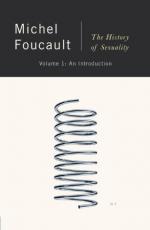
|
| Name: _________________________ | Period: ___________________ |
This test consists of 5 multiple choice questions, 5 short answer questions, and 10 short essay questions.
Multiple Choice Questions
1. What were the effects of the power exercised over sexuality in the nineteenth century?
(a) It was successful in making the topic of sexuality taboo.
(b) It created a multiplication of singular sexualities and pleasure power spirals.
(c) It set practicable boundaries for sexuality.
(d) It set up a barrier against sexuality that was too rigid and provoked a backlash.
2. What explanation does Foucault say is historically applied to the evolution of sexuality after the fact?
(a) It is repressed because it is incompatible with a general and intensive work imperative.
(b) That it was necessary to maintain public health.
(c) That it was an effect of the changing values of the industrial age.
(d) That it came with a blossoming of religious insight.
3. Per Foucault, what does our tone of voice tell us when we speak about sexuality?
(a) That we long for more understanding and help.
(b) That we derive sexual pleasure from it.
(c) That we feel we are being subversive.
(d) That we are ashamed of our sexuality.
4. What does Foucault mean by "we other Victorians?"
(a) We are continuing the progress of liberation from repression started by the Victorians.
(b) We are unable to willfully escape the supposed historical repression of sexuality.
(c) We are trying to restore sexuality as it was during the Victorian era.
(d) We are on the brink of the biggest change in sexuality since the Victorian era.
5. What is the connection Foucault makes between the author of "My Secret Life" and the peasant Jouy?
(a) They were both struggling against power mechanisms out of their domain.
(b) Sex became something to say and to exhaustively put into words.
(c) Their actions were symptomatic of repression.
(d) They were both anomalies to science.
Short Answer Questions
1. What can be said about the discourse on sex Foucault sets forth?
2. Per Foucault, what happened the "will to knowledge" about sexuality under the taboo of sexuality?
3. Which is NOT a center that Foucault recognizes as having produced discourses on sex in the eighteenth and nineteenth centuries?
4. Which of the following is NOT listed as one of the accepted ways to free oneself from the effects of sexual repression?
5. Which of the many great innovations in the techniques of power in the eighteenth century was inextricably interwoven with the discourse on sex?
Short Essay Questions
1. Foucault says the repression hypothesis should be abandoned; what does he purport that power structures seek over sexuality? Why?
2. How did the focus of sexual control change from the eighteenth to nineteenth century? Where was it and where did it shift to?
3. What is the classification of perversions, and what effect did it have?
4. What is the medicalization of sexuality? What relationship does it create?
5. What did the medicalization of the effects of confession promise, and how did that effect scientia sexualis?
6. Briefly define the changes that happened to confessions regarding sex in the seventeenth century, and how it affected sexual discourse.
7. What were the objectives of the the extensive laws regulating the actions of married couples in the eighteenth century?
8. What does Foucault mean by the "speaker's benefit?"
9. Who was the peasant Jouy, and why was he significant to Foucault's argument?
10. What does Foucault say was the model for modern sexual discourse in the west? What elements of it remain?
|
This section contains 1,085 words (approx. 4 pages at 300 words per page) |

|




